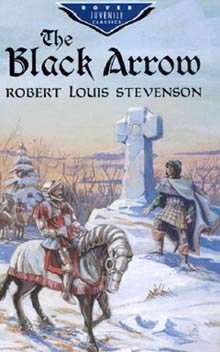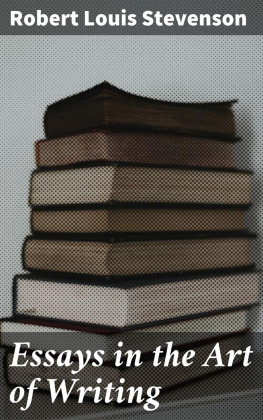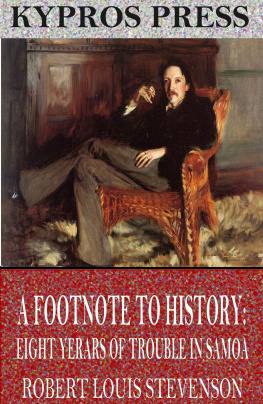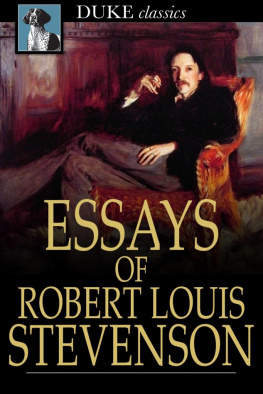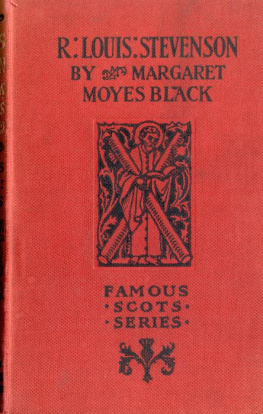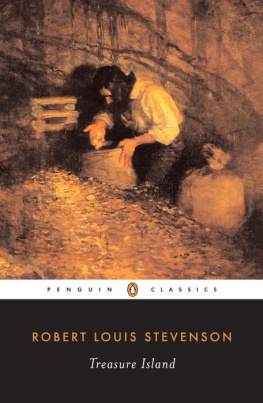Robert Stevenson - Weir of Hermistone
Here you can read online Robert Stevenson - Weir of Hermistone full text of the book (entire story) in english for free. Download pdf and epub, get meaning, cover and reviews about this ebook. genre: Prose. Description of the work, (preface) as well as reviews are available. Best literature library LitArk.com created for fans of good reading and offers a wide selection of genres:
Romance novel
Science fiction
Adventure
Detective
Science
History
Home and family
Prose
Art
Politics
Computer
Non-fiction
Religion
Business
Children
Humor
Choose a favorite category and find really read worthwhile books. Enjoy immersion in the world of imagination, feel the emotions of the characters or learn something new for yourself, make an fascinating discovery.

- Book:Weir of Hermistone
- Author:
- Genre:
- Rating:4 / 5
- Favourites:Add to favourites
- Your mark:
- 80
- 1
- 2
- 3
- 4
- 5
Weir of Hermistone: summary, description and annotation
We offer to read an annotation, description, summary or preface (depends on what the author of the book "Weir of Hermistone" wrote himself). If you haven't found the necessary information about the book — write in the comments, we will try to find it.
Weir of Hermistone — read online for free the complete book (whole text) full work
Below is the text of the book, divided by pages. System saving the place of the last page read, allows you to conveniently read the book "Weir of Hermistone" online for free, without having to search again every time where you left off. Put a bookmark, and you can go to the page where you finished reading at any time.
Font size:
Interval:
Bookmark:
Weir of Hermistone
Preface
Introductory
I saw rain falling and the rainbow drawn
On Lammermuir. Hearkening I heard again
In my precipitous city beaten bells
Winnow the keen sea wind. And here afar,
Intent on my own race and place, I wrote.
Take thou the writing: thine it is. For who
Burnished the sword, blew on the drowsy coal,
Held still the target higher, chary of praise
And prodigal of counsel - who but thou?
So now, in the end, if this the least be good,
If any deed be done, if any fire
Burn in the imperfect page, the praise be thine.
IN the wild end of a moorland parish, far out of the sight of any house, there stands a cairn among the heather, and a little by east of it, in the going down of the brae-side, a monument with some verses half defaced. It was here that Claverhouse shot with his own hand the Praying Weaver of Balweary, and the chisel of Old Mortality has clinked on that lonely gravestone. Public and domestic history have thus marked with a bloody finger this hollow among the hills; and since the Cameronian gave his life there, two hundred years ago, in a glorious folly, and without comprehension or regret, the silence of the moss has been broken once again by the report of firearms and the cry of the dying.
The Deil's Hags was the old name. But the place is now called Francie's Cairn. For a while it was told that Francie walked. Aggic Hogg met him in the gloaming by the cairnside, and he spoke to her, with chattering teeth, so that his words were lost. He pursued Rob Todd (if any one could have believed Robbie) for the space of half a mile with pitiful entreaties. But the age is one of incredulity; these superstitious decorations speedily fell off; and the facts of the story itself, like the bones of a giant buried there and half dug up, survived, naked and imperfect, in the memory of the scattered neighbours. To this day, of winter nights, when the sleet is on the window and the cattle are quiet in the byre, there will be told again, amid the silence of the young and the additions and corrections of the old, the tale of the Justice-Clerk and of his son, young Hermiston, that vanished from men's knowledge; of the two Kirsties and the Four Black Brothers of the Cauldstaneslap; and of Frank Innes, "the young fool advocate," that came into these moorland parts to find his destiny.
CHAPTER I
Life and Death of Mrs. Weir
THE Lord Justice-Clerk was a stranger in that part of the country; but his lady wife was known there from a child, as her race had been before her. The old "riding Rutherfords of Hermiston," of whom she was the last descendant, had been famous men of yore, ill neighbours, ill subjects, and ill husbands to their wives though not their properties. Tales of them were rife for twenty miles about; and their name was even printed in the page of our Scots histories, not always to their credit. One bit the dust at Flodden; one was hanged at his peel door by James the Fifth; another fell dead in a carouse with Tom Dalyell; while a fourth (and that was Jean's own father) died presiding at a Hell-Fire Club, of which he was the founder. There were many heads shaken in Crossmichael at that judgment; the more so as the man had a villainous reputation among high and low, and both with the godly and the worldly. At that very hour of his demise, he had ten going pleas before the Session, eight of them oppressive. And the same doom extended even to his agents; his grieve, that had been his right hand in many a left-hand business, being cast from his horse one night and drowned in a peat-hag on the Kye-skairs; and his very doer (although lawyers have long spoons) surviving him not long, and dying on a sudden in a bloody flux.
In all these generations, while a male Rutherford was in the saddle with his lads, or brawling in a change-house, there would be always a white- faced wife immured at home in the old peel or the later mansion-house. It seemed this succession of martyrs bided long, but took their vengeance in the end, and that was in the person of the last descendant, Jean. She bore the name of the Rutherfords, but she was the daughter of their trembling wives. At the first she was not wholly without charm. Neighbours recalled in her, as a child, a strain of elfin wilfulness, gentle little mutinies, sad little gaieties, even a morning gleam of beauty that was not to be fulfilled. She withered in the growing, and (whether it was the sins of her sires or the sorrows of her mothers) came to her maturity depressed, and, as it were, defaced; no blood of life in her, no grasp or gaiety; pious, anxious, tender, tearful, and incompetent.
It was a wonder to many that she had married - seeming so wholly of the stuff that makes old maids. But chance cast her in the path of Adam Weir, then the new Lord-Advocate, a recognised, risen man, the conqueror of many obstacles, and thus late in the day beginning to think upon a wife. He was one who looked rather to obedience than beauty, yet it would seem he was struck with her at the first look. "Wha's she?" he said, turning to his host; and, when he had been told, "Ay," says he, "she looks menseful. She minds me - "; and then, after a pause (which some have been daring enough to set down to sentimental recollections), "Is she releegious?" he asked, and was shortly after, at his own request, presented. The acquaintance, which it seems profane to call a courtship, was pursued with Mr. Weir's accustomed industry, and was long a legend, or rather a source of legends, in the Parliament House. He was described coming, rosy with much port, into the drawing-room, walking direct up to the lady, and assailing her with pleasantries, to which the embarrassed fair one responded, in what seemed a kind of agony, "Eh, Mr. Weir!" or "O, Mr. Weir!" or "Keep me, Mr. Weir!" On the very eve of their engagement, it was related that one had drawn near to the tender couple, and had overheard the lady cry out, with the tones of one who talked for the sake of talking, "Keep me, Mr. Weir, and what became of him?" and the profound accents of the suitor reply, "Haangit, mem, haangit." The motives upon either side were much debated. Mr. Weir must have supposed his bride to be somehow suitable; perhaps he belonged to that class of men who think a weak head the ornament of women - an opinion invariably punished in this life. Her descent and her estate were beyond question. Her wayfaring ancestors and her litigious father had done well by Jean. There was ready money and there were broad acres, ready to fall wholly to the husband, to lend dignity to his descendants, and to himself a title, when he should be called upon the Bench. On the side of Jean, there was perhaps some fascination of curiosity as to this unknown male animal that approached her with the roughness of a ploughman and the APLOMB of an advocate. Being so trenchantly opposed to all she knew, loved, or understood, he may well have seemed to her the extreme, if scarcely the ideal, of his sex. And besides, he was an ill man to refuse. A little over forty at the period of his marriage, he looked already older, and to the force of manhood added the senatorial dignity of years; it was, perhaps, with an unreverend awe, but he was awful. The Bench, the Bar, and the most experienced and reluctant witness, bowed to his authority - and why not Jeannie Rutherford?
The heresy about foolish women is always punished, I have said, and Lord Hermiston began to pay the penalty at once. His house in George Square was wretchedly ill-guided; nothing answerable to the expense of maintenance but the cellar, which was his own private care. When things went wrong at dinner, as they continually did, my lord would look up the table at his wife: "I think these broth would be better to sweem in than to sup." Or else to the butler: "Here, M'Killop, awa' wi' this Raadical gigot - tak' it to the French, man, and bring me some puddocks! It seems rather a sore kind of a business that I should be all day in Court haanging Raadicals, and get nawthing to my denner." Of course this was but a manner of speaking, and he had never hanged a man for being a Radical in his life; the law, of which he was the faithful minister, directing otherwise. And of course these growls were in the nature of pleasantry, but it was of a recondite sort; and uttered as they were in his resounding voice, and commented on by that expression which they called in the Parliament House "Hermiston's hanging face" - they struck mere dismay into the wife. She sat before him speechless and fluttering; at each dish, as at a fresh ordeal, her eye hovered toward my lord's countenance and fell again; if he but ate in silence, unspeakable relief was her portion; if there were complaint, the world was darkened. She would seek out the cook, who was always her SISTER IN THE LORD. "O, my dear, this is the most dreidful thing that my lord can never be contented in his own house!" she would begin; and weep and pray with the cook; and then the cook would pray with Mrs. Weir; and the next day's meal would never be a penny the better - and the next cook (when she came) would be worse, if anything, but just as pious. It was often wondered that Lord Hermiston bore it as he did; indeed, he was a stoical old voluptuary, contented with sound wine and plenty of it. But there were moments when he overflowed. Perhaps half a dozen times in the history of his married life - "Here! tak' it awa', and bring me a piece bread and kebbuck!" he had exclaimed, with an appalling explosion of his voice and rare gestures. None thought to dispute or to make excuses; the service was arrested; Mrs. Weir sat at the head of the table whimpering without disguise; and his lordship opposite munched his bread and cheese in ostentatious disregard. Once only, Mrs. Weir had ventured to appeal. He was passing her chair on his way into the study.
Font size:
Interval:
Bookmark:
Similar books «Weir of Hermistone»
Look at similar books to Weir of Hermistone. We have selected literature similar in name and meaning in the hope of providing readers with more options to find new, interesting, not yet read works.
Discussion, reviews of the book Weir of Hermistone and just readers' own opinions. Leave your comments, write what you think about the work, its meaning or the main characters. Specify what exactly you liked and what you didn't like, and why you think so.

